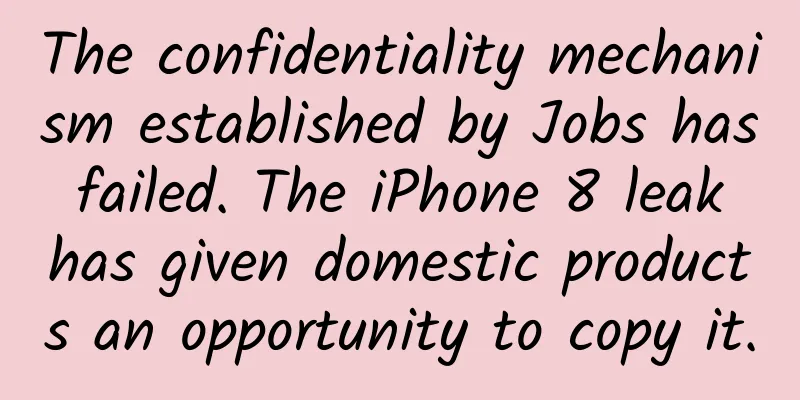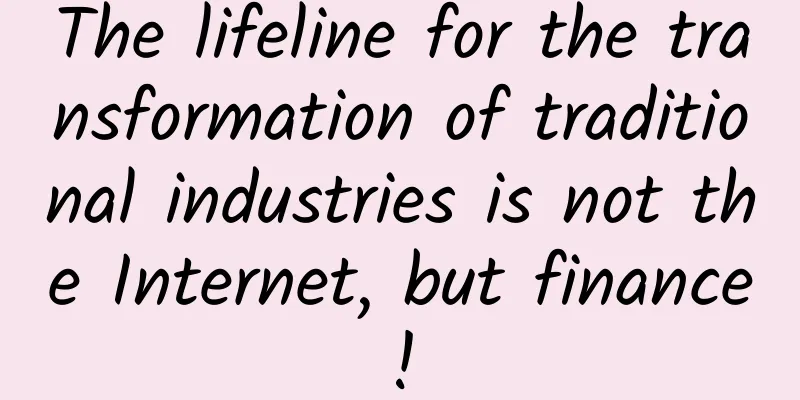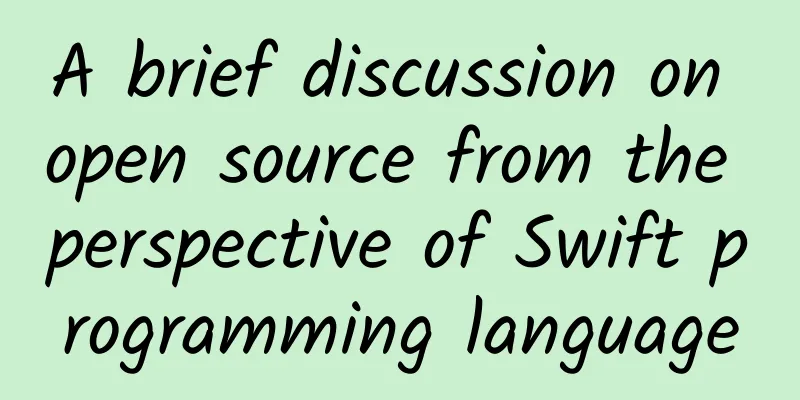The confidentiality mechanism established by Jobs has failed. The iPhone 8 leak has given domestic products an opportunity to copy it.

|
"Big things have big difficulties," said Wang Xifeng in "Dream of Red Mansions". The same is true for Apple, the world's largest consumer electronics company. As we all know, Apple is a rare technology company in the world that is driven by design. It has always attached great importance to the confidentiality of new products. Before joining Apple, every designer or engineer must not only sign a thick confidentiality agreement, but also undergo a long period of confidentiality training. In order to achieve strict confidentiality in every link of design and production, Apple can be said to have done everything possible.
However, with the mass production of iPhone, starting from the iPhone 6 era, Apple's confidentiality seems to be getting more and more lax, and every year the information of the new iPhone is leaked by various spy photos and gossips. Apple's new product launch conference is no longer like a carnival full of surprises, but more like a question-answering session after a big exam, to see which answers everyone got right and which small details were missed. The leak of iPhone product details every year can satisfy the anticipation of Apple fans for the new phone, and also inadvertently help the brothers in the far east. Apple spends a lot of effort on design, but is repeatedly beaten by Chinese mobile phone manufacturers' "copycatism", which has become an important means for Chinese manufacturers to save design costs. Since its release last fall, the iPhone 7 has been controversial due to its lack of innovation and has been accused of making way for the 10th anniversary iPhone 8. This year, Apple will finally release the big move it has been holding back for a long time, and it is basically certain that the iPhone 8 will be the largest upgrade in recent years.
However, now that it is more than half a year before the official announcement, many features of iPhone 8 have been revealed, and they are highly credible. Judging from the leaked information, iPhone 8 is indeed Apple's comeback, and it is expected to end the public's perception that Apple has "lost its innovative ability." However, the iPhone 8's killer feature has been unveiled so early, which is bound to lead to a wave of plagiarism, and people can't help but wonder what happened to Apple's confidentiality project? "No paper left" confidentiality measures Although Apple employees are honored to work for Apple, they dare not talk about their work with others, because if they are not careful, they will be fired in minutes if they violate the confidentiality agreement. But in fact, since the Steve Jobs era, Apple has been keeping a hand in everything and not giving employees the opportunity to get involved in business secrets. In addition to routine inspections of entering and leaving the headquarters, Apple also splits each ongoing project into several underlying projects and names them with different code names. Even if there are spies who can freely enter and leave Apple's headquarters, it is impossible to piece together the original appearance of each sub-project.
Sonny Dickson, a well-known foreign Apple whistleblower, revealed that Apple had set up two independent R&D teams for the first iPhone, one of which was tasked with "building" the iPod into a mobile phone, and the other was tasked with condensing the OS X system into mobile devices. Countless staff members were only responsible for designing a functional module and had no idea what product they were designing.
For contract manufacturers that may leak information, such as Foxconn, Apple requires the establishment of a multi-layered access control system and fingerprint recognition devices to confirm the identity of employees. Not only that, Apple even worked with a paper company to design a paper that can trigger metal detectors to prevent employees from taking design drawings or operating instructions out of the factory. △ Brian Hogan, who "lost both his wife and his army" However, even so, leaks also occurred during the high-pressure era of confidentiality when Jobs was still at Apple. In March 2010, Gray Powell, a 27-year-old Apple engineer, went to a bar in Redwood City in the San Francisco Bay Area to celebrate his birthday, but he left an iPhone 4 prototype in the bar. The phone was later picked up by Brian Hogan, who sold it to the well-known technology media Gizmodo for $5,000. This is the famous iPhone 4 "bar door". At that time, Jobs was furious and personally assisted the police in the investigation. In the end, Brian Hogan was sued, and the legal fees alone exceeded $5,000. It can be said that he lost more than he gained. Gray Powell, who lost the prototype, was kicked out of Apple by Jobs. After that, whenever Apple tested its products on a large scale, it would go to great lengths to dress up the products to look like products from other brands before distributing them to testers. Confidentiality is the primary productive force Confidentiality is a tradition that Apple has always maintained. As mentioned above, compared with other brands, Apple's confidentiality is unprecedented. Confidentiality has even become one of Apple's powerful productivity. Thanks to Apple's strict confidentiality measures, each generation of iPhone can maintain continuous high-intensity exposure before it is released, allowing global media to report Apple's every move for free and in all aspects. This effect alone is worth a lot of money. In addition, as we mentioned before, Apple is a unique design-driven technology company. Within the company, the design department is superior to the engineering department. Jobs' pursuit of technological aesthetics has led Apple to invest huge amounts of money in design and R&D every year. The unique design language and outstanding aesthetics have always been the magic weapon for the iPhone to almost monopolize the high-end market. "The amount of money Apple spends on iPhone confidentiality every year is an astronomical figure, even higher than what most domestic mobile phone manufacturers spend on research and development." A Chinese engineer working at Apple's Cupertino headquarters said, "This establishes the iPhone's position as the leader in the high-end market." However, this advantage can be easily copied.
△Meizu Pro6 copied the appearance but not the essence Apple has sued Samsung several times because of design elements that are too similar. However, domestic mobile phones still dare to use Apple's design without any violation. What's more, some manufacturers apply the leaked elements of iPhone to their own mobile phones before the iPhone is released. For example, in April last year, Meizu Pro6 used the same antenna band as iPhone 7, successfully intercepting it; LeTV Super Phone 2, which was also released in April, also followed the rumored iPhone 7, canceled the headphone jack, and realized "Hi-Fi" through the data cable port. Some people joked that Meizu and LeEco could sue Apple for copyright infringement after the release of iPhone 7. They copied others and submitted their papers before others. No wonder Apple attaches great importance to confidentiality. iPhone information leak points the way for domestic manufacturers When the first two generations of iPhone were small and beautiful products, the confidentiality work was carried out smoothly. However, starting from iPhone 3GS, the iPhone gradually showed its edge, gradually gained popularity among the public, and began to develop into a tens of millions of units.
At this time, the difficulty of keeping secrets has also risen to a level that is difficult to control. Within Apple, confidentiality work can still be carried out normally, but on the supply chain side, Apple's control has been greatly tested. The stricter the confidentiality measures are, the more people are involved, and the more unstable it becomes. Cases of iPhone theft through collusion between insiders and outsiders are not uncommon. In addition, due to the extreme media attention, Apple's every move is watched by various analysts. Patent applications are of course a matter of course, but orders from suppliers, and investments or even acquisitions of related technology companies are more direct indicators of Apple's next move. Since the decline of iPhone 6s, Apple has been plagued by the controversy of "innovation exhaustion". iPhone 7 still inherits the design elements of iPhone 6, and it is also the first time that Apple has adopted a single design language for three generations of iPhone. Everyone unanimously speculates that this is to make way for iPhone 8, which will be the tenth anniversary of Apple mobile phones. In any case, it has become a consensus that Apple will finally use its killer weapon in this year's iPhone 8.
According to information leaked from multiple sources, conventional upgrades such as CPU and battery will be ignored. Apple will use an OLED screen on the iPhone 8, the double-sided glass design will return, and wireless charging will be supported for the first time. These changes are almost certain to be indirectly leaked from Apple's supply and partner manufacturers. Apple has already signed an OLED screen order with Samsung, and with additional orders, the total is 160 million units. With the use of Samsung's own machines, it is not far from draining Samsung's production capacity. Samsung used to like to tear up agreements and cut off supply, and Apple probably also took precautions in the agreement. Moreover, after the Note7 explosion incident last year, the loss of more than 10 billion US dollars also forced Samsung to focus more on current profits and cling to Apple's thighs.
Wireless charging may be one of the few truly cool technologies on the iPhone 8. Unlike the contact-based wireless charging used by Samsung, Nokia, etc., the company that will be working with Apple is Energous, which stole the show at CES 2015. Energous is a company that develops long-distance wireless charging. CEO Steve Rizzone also said at the just-concluded CES 2017 that it has signed a contract with "the world's largest consumer electronics company," and this company is obviously Apple. Not only that, recently, there have been reports that Apple has quietly joined the WPC, the Wireless Power Consortium. All signs indicate that the iPhone 8 will be equipped with this cool technology that can be "charged remotely" within five meters, so much so that Energous' stock price has risen by an astonishing 400% since the beginning of the year. At present, there are only a few mobile phone manufacturers in the world that have adopted wireless charging, and domestic mobile phone manufacturers are simply not interested in contact wireless charging, a technology that does not improve user experience much. Today, when the prices of imported mobile phone parts are rising collectively, it is better to lower costs and prices and focus on price wars rather than paying a large amount of patent fees in exchange for a flashy function. But if Apple adopts this technology, the situation will be completely different. The selling point of "achieving the same functions as iPhone at 1XXX price" seems to never be outdated. By riding the iPhone's coattails, Apple has squeezed into the "high-end" circle, and continued the long journey of domestic products to impact the high-end market. We seem to have predicted that a large number of domestic wireless charging mobile phones are already on the way. As a winner of Toutiao's Qingyun Plan and Baijiahao's Bai+ Plan, the 2019 Baidu Digital Author of the Year, the Baijiahao's Most Popular Author in the Technology Field, the 2019 Sogou Technology and Culture Author, and the 2021 Baijiahao Quarterly Influential Creator, he has won many awards, including the 2013 Sohu Best Industry Media Person, the 2015 China New Media Entrepreneurship Competition Beijing Third Place, the 2015 Guangmang Experience Award, the 2015 China New Media Entrepreneurship Competition Finals Third Place, and the 2018 Baidu Dynamic Annual Powerful Celebrity. |
<<: Domestic brands will reduce prices and enter the first echelon in the future to survive
>>: The automotive industry is uneasy due to the double points policy for passenger cars
Recommend
4 indicators to effectively identify channel cheating using data analysis!
As we all know, the user growth of any Internet p...
Do plants have the same senses as animals, such as hearing, seeing, smelling and tasting?
Animals have hearing, vision, smell and taste, so...
“Irradiated food” is related to radiation. Is it harmful to the human body if eaten?
Myth: "'Irradiated food' is related ...
Android Q Beta 4 experience: Let's take a look at the future of Andriod 10
Recently, Google pushed the latest beta system An...
Technology Fun: Top 10 Weird Technology Solutions of 2014
[51CTO Translation] Cyber telepathy, cooking AI...
The love-hate relationship between development and testing
[[228041]] IT practitioners are always in dire st...
Will the color TV industry emerge from the cold winter and reach a rebound turning point?
It is not certain that the Chinese color TV marke...
Three thousand years after his death, the head of state made an official visit to France
In September 1976, the Paris-Le Bourget Airport w...
Can it replace the game mode? The focus mode updated in the official version of iOS 15 is surprisingly practical
Game mode is not some black technology. In essenc...
Major discovery! Su Shi’s family cemetery confirmed...but why is Su Shi not there?
A few days ago, a major archaeological discovery ...
A brief talk about user operations, my AARRR model!
1. Start by reconstructing the AARRR model After ...
How much does it cost to make a small program?
Nowadays, mini programs are becoming more and mor...
From "chopping rockets with chopsticks" to adjusting the water temperature in the shower, this knowledge is indispensable
At about 7:32 a.m. local time on October 13 (20:3...
A detailed explanation of the marketing and promotion methods of Internet finance from 5 cycles!
This article will reveal the underlying logic of ...
25 "Empty-handed" APP promotion methods, you deserve it
Due to various reasons, our company is not like m...









